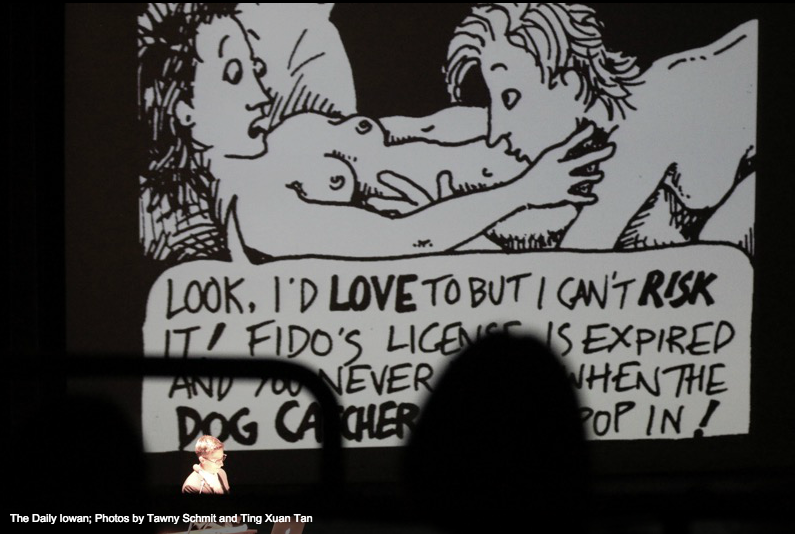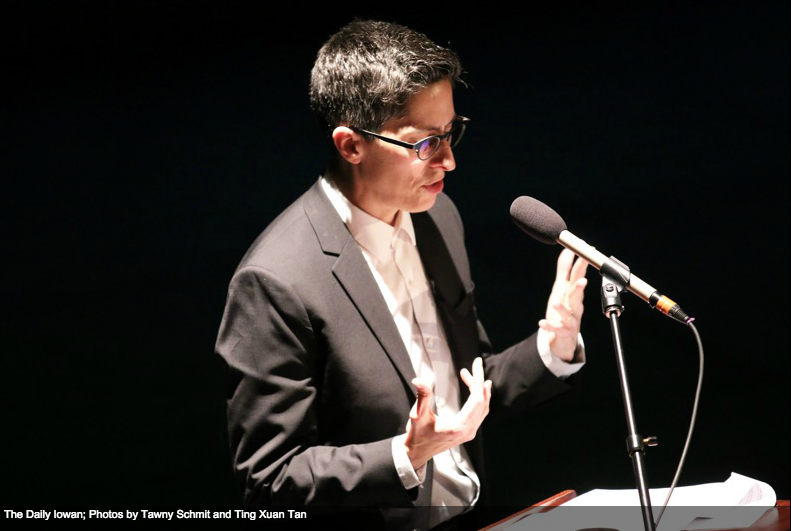Alison Bechdel partook in an informal Q&A, book signing, and lecture on Tuesday, April 5, as part of the Mission Creek Festival.
By Tessa Solomon | [email protected]
On the Englert’s stage a single wooden stool stands empty, illuminated by purple and white backlight. In a half circle surrounding it, the crowd fidgets in black plastic seats, waiting for the informal Q&A to begin. Some clench moleskine notebooks, others weathered copies of Fun Home. Suddenly a hush sweeps the stage as each notices the quiet figure standing still by the backstage door.
Alison Bechdel, writer, cartoonist, and icon, has made her appearance.
She approaches the mic with a nervous smile. Decked in a black suit and rocking on the heels of her brown leather loafers, she quips, “Why am I so neurotic, why am I telling you how anxious I am?”
The crowd laughs, and the spell of her presence does not break, but relaxes into something encouraging and inclusive. The Q&A was not formally broadcast to Iowa City, instead a casual encounter between fans and Bechdel before her 7:30 p.m. lecture that night. It becomes a discussion on Fun Home, gender politics, and Virginia Woolf.
Listen to an excerpt of Alison Bechdel’s Q&A session.
The ball rolls with queries on her breakout comic, “Dykes To Watch Out For,” which only ended its 20 plus run in 2008. Its characters captured the everyday and broad struggles of the queer community. Though beloved by its audience, Bechdel addresses the pressure such regard weighed on her creative process.
“I stopped thinking about an audience when writing ‘Dykes To Watch Out For,’” Bechdel said, “And that was incredibly liberating.”
From there, the eager audience probed her writing process. Again she honestly admitted her faults, professing a desire to read and draw more.
But at the same reassuring, “I think it’s okay to not be writing and drawing every moment.”
When Bechdel is writing though, her audience is listening. Today she is not alone as a voice for the lesbian community. From Transparent to recent Axe Body Spray commercials, the queer community is gaining a face in the mainstream media. A dominant concern of the Q&A, though, was whether Bechdel felt the face being shown was an appropriate representation.
To Bechdel, who admits inseparability between her sexuality, self, and creativity, the audience also asked: how does it feel to be a part of that mainstream?
For a moment, Bechdel visibly struggles with the question, chewing her lip.
“I feel a sense of loss, but that’s how culture works,” she said. “They neutralize the
threatening elements of the subculture. They give allusions, and what’s loss is authenticity. I shouldn’t feel bad – it’s great to see shows like Transparent – but I still do.”
After the Q&A Bechdel hung out on the stage, signing books, and graciously accepting offerings of DIY zines. The crowd disperses, animated with their encounter.
That night though, many of the same faces could be spotted outside the theater for Bechdel’s official Mission Creek Festival lecture. Under the light of the flashing marquee, the line snaked down Washington Street. At 6:30 p.m. the doors opened, and an hour later the theater was packed, stragglers wandering the aisles searching for a vacant seat. Without warning the lights were doused and conversation died. From the right, Alison Bechdel bound across the stage’s surface, smiling widely and waving to the roaring crowd.
While the earlier Q&A veered between topics and explored tangents, Bechdel led the lecture through a narrative. She discussed the ways writing has been the tool to express joy, combat depression, and spur conversation for her, and her family.
Beginning with her childhood, she displayed projections of early, childish comics.
“When I was a kid, there was no doubt, only joy in drawing,” Bechdel said. “It’s different now being an adult. There’s an odd double edge in doing what you love to eat.”
She guided the crowd through comic scenes from both Fun Home and Are You My Mother, delving into her creative process and philosophy.
“To be an artist you need a balance between the creative flow and the self-discipline to make meaningful work,” Bechdel said.
Part of that creation, she explained, necessitated an honesty and bravery to tell the truth.
Click here to check out a photo slideshow of Bechdel’s lecture.
 “I wanted to be very open about my lesbianism, in a way my father was not,” she said, while strips of Fun Home illuminated the screen.
“I wanted to be very open about my lesbianism, in a way my father was not,” she said, while strips of Fun Home illuminated the screen.
The book chronicles the dynamics of her family, the unspoken lies and truths that constructed her family, centering on the relationship between her and her closeted father. The crux is formed in his death, a suspected suicide. It was an event whose ripples spread through her life for years.
“My father’s death created a vacuum that liberated me,” she said.
She spoke in depth on the results of that liberation, “Dykes To Watch out For,” and her early years as a member in the lesbian community.
“It’s getting harder to convey to people how hostile the environment was towards people in the gay community. Just being lesbian and out was a political act,” she said. “But I thought if I could show our real lives that could help change things.”
The lecture transitioned into another brief Q&A. There, an audience member asked, if you had been born into another era, a 19 year-old coming out now, how would you be different?
Bechdel paused, and thought.
“Who we are is inseparable from the generation we were born into,” she responded. “My father’s generation shaped him, just as mine shaped who I became.”
But what would today’s generation be like without having her story and struggles to grow up with? The question is infinite, but by the applause that followed her off stage, it’s safe to say worse off.



